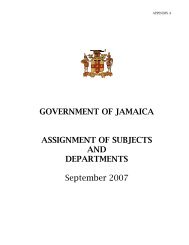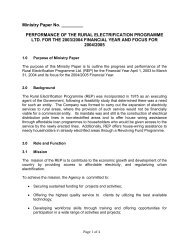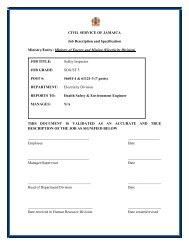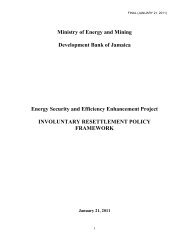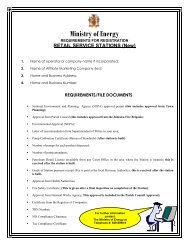Jamaica Biofuels Report - Ministry of Energy
Jamaica Biofuels Report - Ministry of Energy
Jamaica Biofuels Report - Ministry of Energy
You also want an ePaper? Increase the reach of your titles
YUMPU automatically turns print PDFs into web optimized ePapers that Google loves.
In-Depth Project Feasibility StudiesIn order to attract capital and secure government support for cane energy projects, especially,decision-makers will need the results <strong>of</strong> in-depth feasibility analysis <strong>of</strong> specific investmentprospects. Studies at three prospective locations would likely be sufficient, covering at aminimum, options for sugar production and electric cogeneration without ethanol, production<strong>of</strong> ethanol and electricity alone, and flexible co-production <strong>of</strong> sugar, molasses, ethanol andelectric power following the Brazilian model. The feasibility studies should include conceptualsystem designs, identification and sizing <strong>of</strong> major components, energy and mass balances,capital and operating costs, and revenue requirements.Candidate mill sites could be selected on the basis <strong>of</strong> owner and management interest andwillingness to cooperate with the studies, share costs, and proceed with projects if the resultsare favorable. Outside financial support would no doubt be needed for the studies, and thefirst step, perhaps to be undertaken by the task force, would be to secure grant support frominterested entities like the Organization <strong>of</strong> American States, the Inter-American DevelopmentBank, or the European Union.If successful, the studies will identify and document viable investment opportunities, leadingto financing, construction, and operation <strong>of</strong> new bi<strong>of</strong>uel facilities in succeeding months (SeeProject Implementation below). At the same time, they will serve as concrete indications <strong>of</strong>the specific impacts <strong>of</strong> these facilities for policy makers.<strong>Bi<strong>of</strong>uels</strong> FinancingExpanding bi<strong>of</strong>uels production will require substantial investments <strong>of</strong> capital in agriculturalproduction and processing facilities. Under some circumstances, non-recourse projectfinancing by foreign investors is a possibility, but not without firm raw material and product<strong>of</strong>f-take agreements, which are unlikely in <strong>Jamaica</strong>, where among other things, the lawprohibits exclusivity for domestic ethanol for fuel blending. While individual sugar estateowners may be able to raise capital on the strength <strong>of</strong> their own balance sheets, small farmersand other prospective bi<strong>of</strong>uel enterprises may be too small or weak financially.One way to address capital availability would be to establish a bi<strong>of</strong>uels investment fund in<strong>Jamaica</strong> with the capability to lend to individual ventures and to attract and pool capital fromprivate investors wishing to diversify their exposure within the sector, interested philanthropicfoundations, the private sector windows <strong>of</strong> multilateral development banks, and other similarentities. The fund could then make loans to developers and farmers on terms appropriate totheir projects, accompanied by technical expertise from SIRI and others. In the case <strong>of</strong> smallfarmers, loans could take the form <strong>of</strong> services and equipment to upgrade their productivity, tobe repaid out <strong>of</strong> product sales.Another role the fund could play would be to manage a price stabilization arrangement forfuels, similar to one that existed for sugar prior to privatization <strong>of</strong> The Sugar Corporation <strong>of</strong><strong>Jamaica</strong>. When bi<strong>of</strong>uel prices are high, a portion <strong>of</strong> sales proceeds could be set aside to109




